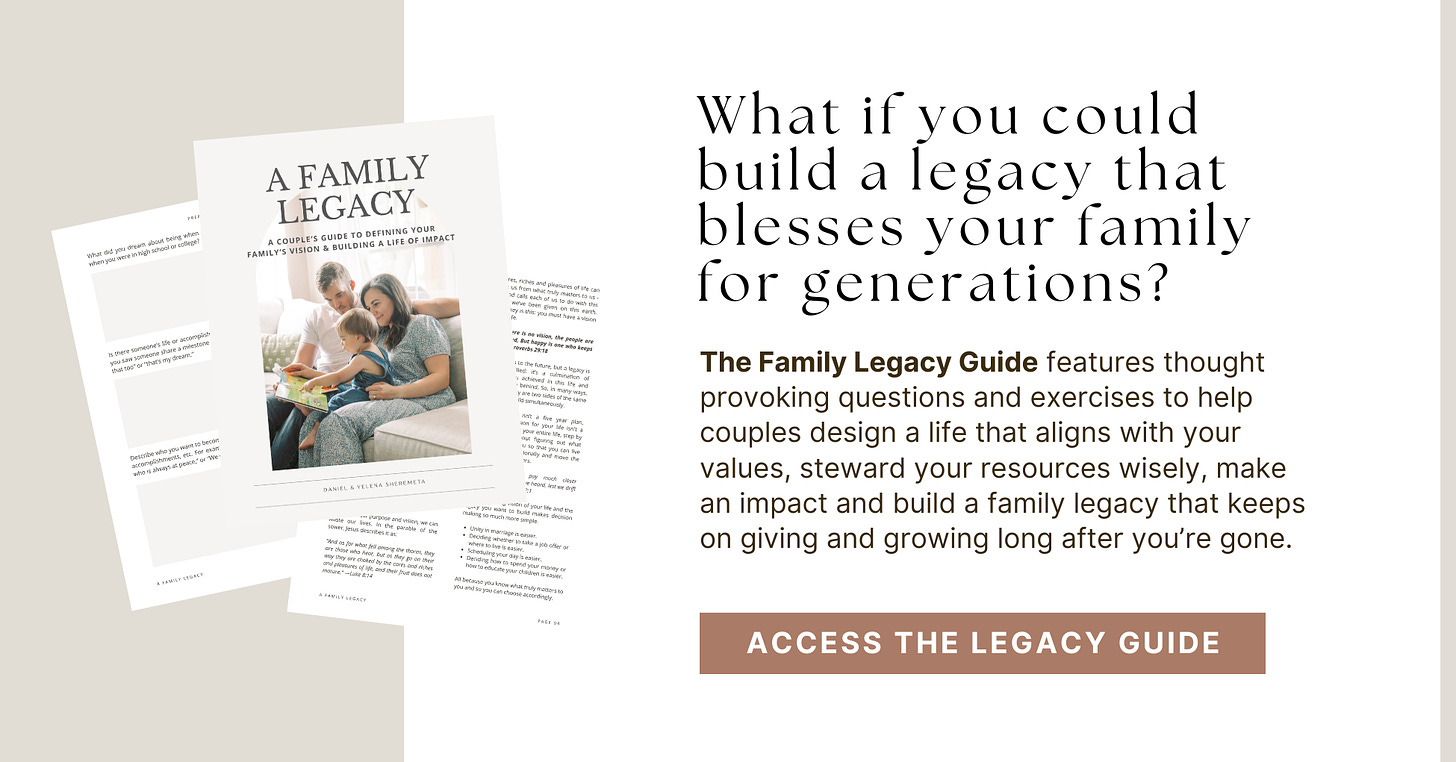Hi, friend! If you're new here, APL is a newsletter for the aspiring modern Proverbs 31 woman, where we talk about building, growing & managing a portfolio of roles, responsibilities & dreams for maximum return on our investment. For more on the topic of women & work, check out my Elevate Blueprint!
Foundations issue impact reports at the end of each year, detailing where their resources went. There’s often testimonials, photos and statistics throughout the report to track that year’s accomplishments. Here’s an example of the 2023 Archewell Foundation Impact Report.
Corporations also issue quarterly and annual reports with their goals, financial statements and other notable highlights and accomplishments.
I wonder how much better stewards we’d be of our time and resources if we had to be more accountable with how we spent our time, money and other God-given resources.
The reality is, we are going to have to provide accountability eventually before the throne of God (1 Peter 4:5).
Romans 14:12 says that “each of us will give an account of himself to God,” including “every careless word” (Matthew 12:36) and “for what [we’ve] done in the body, whether good or evil” (2 Cor. 5:10).
“And I saw the dead, great and small, standing before the throne, and books were opened. Then another book was opened, which is the book of life. And the dead were judged by what was written in the books, according to what they had done.” -Revelation 20:12
It’s what the Parable of the Talents is ultimately about (Matthew 25:14-30):
What did you do with what you were given, whether it was little or a lot? Did you multiply it? Waste it away?
Because here’s the thing about impact reports and corporate filings: the whole point is to show donors and shareholders that the resources entrusted to the foundation and invested in the corporation were used for the intended purpose, spent wisely, and that there is growth.
Similarly, what God entrusted us with is also expected to be used not solely for our benefit, but to grow God’s kingdom. It’s about something larger than ourselves. It’s what will be left behind once we die.
But the reality is, many of us, especially in the U.S. and other first world countries, tend to live for ourselves.
We strive to grow our wealth in order to keep up with the Joneses: a certain style of house, a new car, new phones, dressing and looking a certain way, and then working hard to keep up with the debt payments to finance that lifestyle.
When you’re striving to live a certain lifestyle or make ends meet as inflation makes everything expensive, it’s hard to think about pouring out, giving back, or multiplying.
Maybe that is why the Bible from the beginning talks about giving God your firstfruits. Not the leftovers after all the bills are paid and your needs and wants are taken care of, but the first of everything (Proverbs. 3:9).
Giving unlocks unlimited potential (Luke 6:38, 2 Cor. 9:6-8).
“Bring the full tithe into the storehouse, that there may be food in my house. And thereby put me to the test, says the Lord of hosts, if I will not open the windows of heaven for you and pour down for you a blessing until there is no more need.” -Malachi 3:10
In his book, "I Dare You," William Danforth explains this principle: "Our most valuable possessions are those which can be shared without lessening; those which when shared multiply. Our least valuable possessions are those which when divided are diminished."
You can read more about the importance of philanthropy and giving here, but today, I wanted to focus more on something else that has been the source of my husband’s and I’s conversations from the beginning: building a legacy.
Legacy is defined as an amount of money or property left to someone in a will; the long-lasting impact of particular events, actions, etc. that took place in the past, or of a person’s life.
As my husband and I talk about the legacy we want to leave behind as a couple and a family, we’ve broken it out into three areas of focus:
Our children
Financial & assets
Ministry & community.
Think of it as a three-legged stool where each of these pillars supports the overall legacy we’re building.
I’m not going to share the details of what each of those entails for us personally, mostly because we’re still figuring it out, but I’ll share the general brushstrokes to give you an idea in case you want to do a similar exercise for your family.
Our children
The Bible tasks us to pass on God’s word and His glorious deeds from generation to generation (Ps. 145:4, Ps. 78:4, Deut. 6:5-7) so that generations after us can in turn teach others also (2 Tim. 2:2). We are to train our children up in the way they should go so even when they are old, they will not depart from His way (Pr. 22:6), to bring them up in the discipline and instruction of the Lord (Eph. 6:4).
For us, that looks like focusing on planting God’s word in our children’s hearts and training them up in a way that builds firm values, a strong work ethic, and a Godly character. For example, some of the values that are important to us that we want to instill in our children include hard work, financial stewardship, generosity, and being servant hearted and respectful.
Financial stewardship & assets
Proverbs 13:22 says that “A good man leaves an inheritance to his children’s children, but the sinner’s wealth is laid up for the righteous.”
This is something my husband and I take really seriously, not because we want to leave our kids well off, but more so to leave behind systems, income streams, assets and tools that our kids can use and grow as they provide for their own families.
For example, for us, God willing, this will include family businesses, a ranch, land, passive income streams, a giving foundation, and life insurance policies to be used for infinite banking.
Ministry & community
Both my husband and I are also passionate about using our talents and gifts in ministry and investing in our community.
For example, for us, this includes producing resources like the Dating Guide, youth ministry, being involved in our local church, and mentorship / discipleship.
Overall, the goal of a legacy is not what it can do for me, but what it does for others and how it glorifies God’s name. It’s about multiplication, growth and impact.
Yes, as we build a legacy we are also providing for ourselves and our family in our daily needs today (food, paying our mortgage, bills, etc), but we try to do all things in the context of the bigger picture of what we’re striving to achieve.
Which is why you have to know where you’re going and what you’re working towards. Otherwise, we just drift through this life trying to make ends meet and keeping up with what others are trying to achieve, even if maybe it’s not what we truly want for ourselves.
At the root of building a long-lasting, sustainable, thriving legacy is to seek the Lord and His wisdom and live a righteous life.
You have to get yourself and your family right with God before you seek to grow and multiply things in this world.
Proverbs 8:20-21 says that wisdom walks “in the way of righteousness and in the paths of justice, granting an inheritance to those who love me, and filling their treasuries.”
According to Ecclesiastes 2:26, if you are gathering and accumulating but have nothing to show for it because it all goes to someone else (debts, spending on keeping up with a certain lifestyle, etc), then you are not living a life pleasing to God.
Because to the one who is pleasing in His sight, He gives wisdom and knowledge and joy, and what he grows and accumulates shows fruit.
Wisdom yields wealth and an inheritance.
“You shall remember the Lord your God, for it is He who gives you power to get wealth.” -Deuteronomy 8:18
So, if you haven’t yet, take the time to sit down and write out what legacy you want to leave behind. You can use our three pillar approach or design your own. Do what works best for you, your family and the resources God has entrusted to you.
Let me tell you: doing this will make decision making so much easier. Not just big life decisions like what job to take (or whether you work in a season at all), where to live, who to marry, etc., - but also daily, ordinary decisions like how you spend your day, what to prioritize when a dozen things need your attention, whether you truly want to buy that shirt that popped up on your Instagram, and how we interact with others and our kids.
And when you get to the end of year, it’s that much easier to track the impact of how that year went. Because you know what matters.
What legacy do you hope to leave behind?
My husband and I actually put together a legacy guide for couples to use in defining what it looks like for your family to live a life of impact and to build a long lasting family legacy. You can learn more and get a copy here
Until next time,
YPS
P.S. If you’re a visual learner, I highly recommend putting together a “big vision” board capturing what you’ll be grateful you focused on during your time on this earth. Here are some tips on how to do that!







Perfectly written!